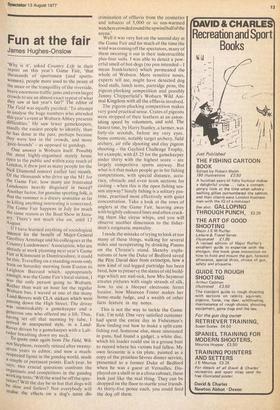Fun at the fair
James Hughes-Onslow
'Why is it', asked Country Life in their report on this year's Game Fair, 'that thousands of sportsmen (and sportswomen), people more used to the peace of the moor or the tranquillity of the riverside, brave enormous traffic jams and even larger crowds to see an almost exact repeat of what they saw at last year's fair?' The editor of The Field was equally puzzled: `To attempt to analyse the huge numbers who attended this year's event at Woburn Abbey presents difficulties.' He saw fewer gamekeepers, usually the easiest people to 'identify, than he has done in the past, perhaps because they were lost in the crowds, and more 'gaze-hounds' — as opposed to gundogs.
One answer is Woburn itself. Possibly the most highly-organised stately home Open to the public and within easy reach of London, it drew just as many people for the Neil Diamond concert earlier last month.
Of the thousands who drive up the M1 for the Game Fair, how many are frustrated Londoners heavily disguised in tweed? Another factor, for genuine sporting folk, is that the summer is a dreary armistice as far as killing anything interesting is concerned. The Game Fair happens in July for much the same reason as the Boat Show in January. There's not much else on, until 12 August.
It I have learned anything olsociological interest for the benefit of Major-General Geoffrey Armitage and his colleagues at the Country Landowners' Association, who are already at work planning next year's Game Fair at Kinmottnt in Dumfriesshire, it could be this. Travelling on a standing-room-only train on Saturday morning from Euston to Leighton Buzzard which, appropriately enough, was the Game Fair's local station. I Was the only person going to Woburn. Rather than wait an hour for the regular Woburn bus, I waved at one of the many Land-Rovers with CLA stickers which were Passing down the High Street. The driver was unmistakably a gamekeeper and a generous one who offered me a lift. Thus, having set off that morning by tube, I arrived in unexpected style, in a LandRover driven by a gamekeeper,with a Labrador breathing down my neck.
To quote once again from The Field, Wilson Stephens, recently retired after twenty
seven years as editor, and now a much
respected figure in the gundog world, made a couple of pertinent points. Each year, he
says, two crucial questions confront the organisers and competitors in the gundog working tests: `Will the wind be off the spec
tators? Will the day be so hot that dogs will t)e slow and listless? Not everybody will realise the effects on a dog's scent dis crimination of effluvia from the cosmetics and tobacco of 5,000 or so. sun-warmed watchers crowded round the upwind half of the arena.'
Well it was very hot on the second day at the Game Fair and for much of the time the wind was coming off the spectators, many of them sweating it out in their indestructible plus-four suits. I was able to detect a powerful smell of hot-dogs (no pun intended —I mean frankfurters) which permeated the whole of Woburn. More sensitive noses, experts tell me, might have detected dog food stalls, lunch tents, partridge pens, the pigeon-plucking competition and possibly Jimmy Chipperfield's Woburn Wild Animal Kingdom with all the effluvia involved.
The pigeon-plucking competition makes very good practical sense. Crates of pigeons were stripped of their feathers at an astonishing speed by volunteers, and sold. The fastest time, by Harry Stanley, a farmer, was forty-six seconds, before my very eyes. Some contests, notably target archery, field archery, air rifle shooting and clay pigeon shooting — the Gaybird Challenge Trophy, for example, with £5.25 for the gamekeeper under thirty with the highest score — are largely competitive sports anyway. But what is it that makes people go in for fishing competitions, with special distance, accuracy, obstacle and even team sections for casting — when this is the open fishing season anyway? Surely fishing is a solitary pastime, practised most effectively with quiet concentration. Take a look at the rows of anglers at the Game Fair, heaving away with brightly coloured lines and often cracking them like circus whips, and you will observe another dimension to the fisherman's enigmatic mentality.
I made the mistake of trying to look at too many of these things, walking for several miles and recuperating by drinking Pimms on the Christie's stand. Sketchy explanations of how the Duke of Bedford saved the Pere David deer from extinction, how a new kind of red-legged partridge has been bred, how to preserve the slates of old buildings which are nail-sick, how Mrs Seymour creates pictures with single strands of silk, how to use a bleeper electronic ferret locator, how Maureen Foster makes her home-made fudge, and a wealth of other facts feature in my notes.
This is not the way to tackle the Game Fair, I'm told. One very satisfied customer had spent the entire day in Fisherman's Row finding out how to make a split-cane fishing rod. Someone else, more interested in guns, had found a gadget, a white disc, which his loader could use in a grouse butt to record where his victims had fallen. My own favourite is a tin plate, painted as a copy of the priceless Sevres dinner service, presented to a former Duke of Bedford when he was a guest at Versailles. Dis played on a shelf or in a china cabinet, these look just like the real thing. They can be dropped on the floor to startle your friends. At thirty-five pence each, you could feed the dog off them.


































 Previous page
Previous page